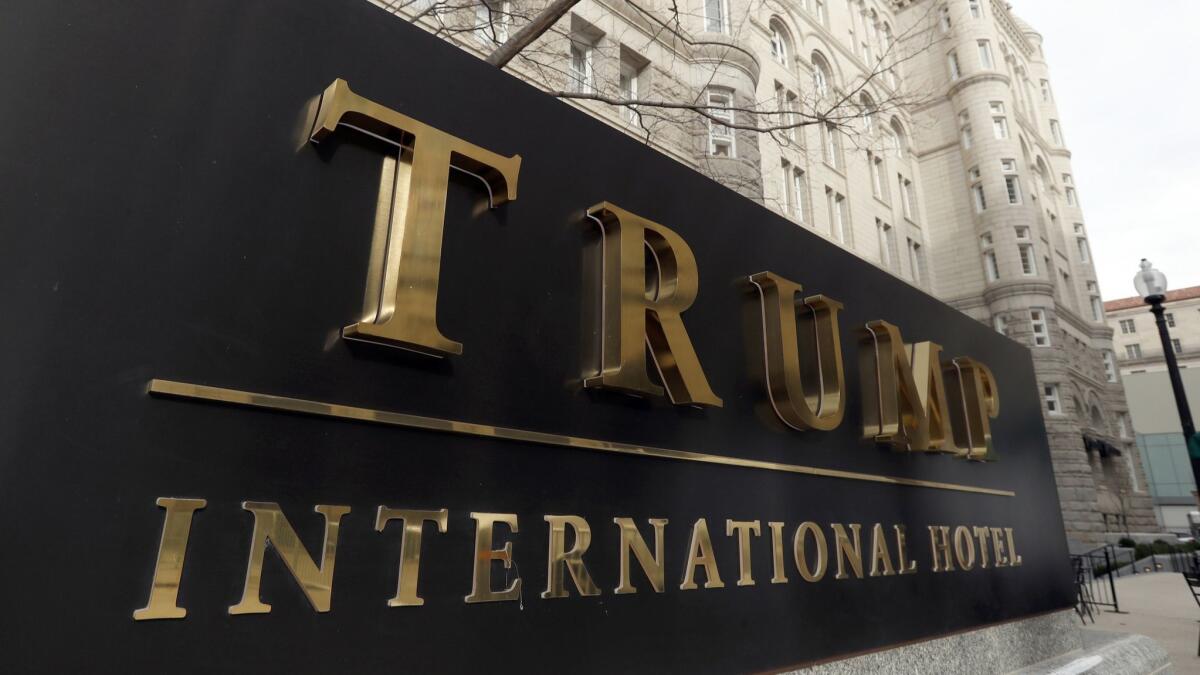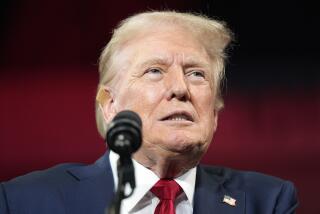Opinion: Trump loses another round in legal battle to prove he’s profiting from his presidency

- Share via
In the battle to hold President Trump accountable for allegedly profiting personally from serving in the White House, a judge’s ruling Monday that congressional Democrats have standing to sue over alleged emoluments violations is a baby step forward. But at least it’s in the right direction.
Emoluments, in case you’ve lost track of this particular presidential scandal, are payments to the president above and beyond his salary, or from foreign governments or their agents. The president faces two landmark lawsuits over the issue.
One, alleging the president enjoys an unfair advantage over other hotel and restaurant owners in the area, was brought by officials in Maryland and the District of Columbia who accuse the president of improperly profiting from foreign officials who rent rooms and facilities at the Trump International Hotel down the street from the White House.
You’d think self-respecting conservatives would be outraged. But, yeah.
Monday’s ruling came in a different case filed by congressional Democrats accusing the president of receiving payments from foreign governments without getting congressional approval first, which they argue the Constitution requires under the foreign emoluments clause.
Key to both legal challenges will be the discovery phase in which the accusers can demand copies of financial records detailing the president’s personal business transactions. But that likely won’t happen until after a few more rounds of appeals.
In both cases, the two sides differ over what exactly constitutes an emolument.
Trump, represented by private attorneys and the Justice Department, argues that it should be narrowly defined as payments that come through employment or gifts, and that Trump’s hotels, golf courses and commercial operations are legitimate business transactions that fall outside the definition of emoluments.
Enter the Fray: First takes on the news of the minute »
His accusers argue (persuasively, in my view, and backed by some word nerds) that the use of the word in the Constitution bars all payments, period. And note that some of the foreign officials who have stayed at Trump International told journalists they did so purely because of who owns it, clearly indicating that the president is profiting from his elected position.
“Why wouldn’t I stay at his hotel blocks from the White House, so I can tell the new president, ‘I love your new hotel!’” one diplomat told the Washington Post just after the 2016 election. “Isn’t it rude to come to his city and say, ‘I am staying at your competitor?’”
You’d think self-respecting conservatives would be outraged. But, yeah.
Both cases are working their way up the appellate ladder, and they could well wind up before the Supreme Court, which has never weighed in on the emoluments clause.
Of course, all of this would be moot if the president had avoided conflicts of interest by placing his assets in a blind trust, as most of his recent predecessors did. Instead, as is his style and personality, he has just forged ahead daring anyone to stop him. Maybe the courts will do just that.
More to Read
A cure for the common opinion
Get thought-provoking perspectives with our weekly newsletter.
You may occasionally receive promotional content from the Los Angeles Times.











